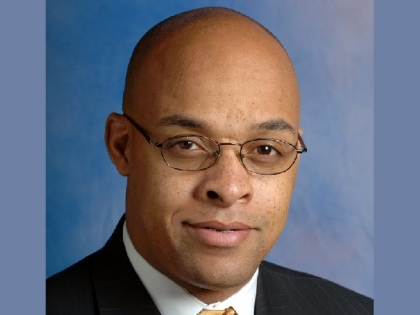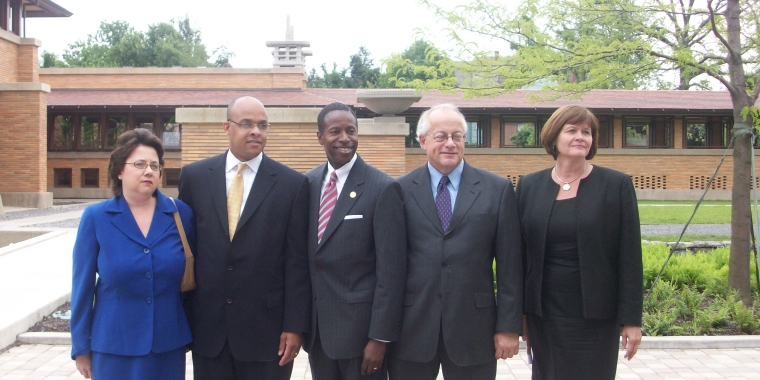
Martin House Announces Major Award By New York State Senate - "Allocation of New York State Funds Provides Critical Support For Interior Restoration of the Darwin Martin House."
Antoine M Thompson
July 24, 2009

FOR IMMEDIATE RELEASE:
Date: July 17, 2009
Contact: Mary F. Roberts,
Executive Director
Martin House Restoration Corporation
716-856-3858
BUFFALO, NEW YORK – The Martin House Restoration Corporation (MHRC) is pleased to announce that a $3,000,000 grant has been awarded by the New York State Senate, funding that will advance a project that is vital to economic growth in the Western New York community. The funds will be used to support interior restoration of Frank Lloyd Wright’s Darwin D. Martin House - the final major phase needed to complete restoration of the house before furnishings and decorative elements can be returned to recreate Wright’s original vision for the estate.
New York State Senate President Malcolm A. Smith, stated that “the future of Buffalo rests with its ability to grow its economy and improve the quality of life. The Martin House project accomplishes both these objectives by preserving an important part of Buffalo’s architectural history and raising the city’s profile in the art world.”
“The Martin House Restoration Corporation board of directors is extremely grateful to Senators Malcolm A. Smith, John L. Sampson, William T. Stachowski and Antoine M. Thompson for their vision and commitment in awarding this grant,” said MHRC president, John N. Walsh, III. “The New York State Senate truly understands the importance the restoration at the Martin House plays in helping to rebuild Buffalo’s economy. When complete, the Complex will claim its rightful place as a cornerstone for cultural tourism in this city and region, and will be a tide that lifts many boats. This grant will serve greatly to advance this last phase of work and will help propel the project toward the finish line.”
Senator Stachowski, a long-time supporter of the Martin House who serves as Assistant Majority Leader for House Operations, added, ““The preservation of Buffalo’s architectural gems is a necessity and the Martin House is at the top of that list. I am proud to play a role in bringing these significant funds back to Buffalo and the Martin House in particular so that future generations can enjoy this treasure. Once completed, the Martin House will attract visitors from across North America and become an integral piece of Buffalo’s tourism industry.”
The Martin House is located in Senator Antoine Thompson’s 60th District. In praising the effect of the Martin House on his district, the Senator said, "I'm happy to be able to contribute to these renovations. The Martin House is such an integral part of Buffalo's art and architectural history. These renovations will hopefully stimulate the economy by encouraging tourism to this dynamic city and region"
Martin House Executive Director, Mary F. Roberts, states that “the Martin House is entering a defining phase of restoration and this funding will help continue the momentum of the project. We are very grateful for this investment which affirms the support of our other generous donors and dedicated volunteers who have invested their time, energy and personal resources in the Martin House.”
Sixty-five per cent of visitors to the Martin House are from outside the eight county region of Western New York. When the restoration of the complex is complete, the Martin House will be marketed on a national basis to achieve its full potential. Independent consultants concluded in a 1996 study that the economic benefit of a restored Martin House could be as much as $17.7 million per year in total economic impact in the region, and would result in the creation of 198 full-time equivalent jobs in the regional economy (at the site and in the hotel, transportation, restaurant, retail and entertainment sectors). Today, the annual economic benefit of a restored Martin House is estimated to exceed $20 million (in 2009 dollars).
Martin House Restoration progresses in carefully planned stages
The interior restoration that this grant will fund will begin as early as possible in 2009, pending the procurement of all necessary funds. Total cost estimates for this phase are currently between $7.5 and $8 million. It marks the fifth and final major component of restoration work at the National Historic Landmark, which has been implemented through the hard work and dedication of the restoration architects, Hamilton Houston Lownie Architects, LLC, and has utilized the construction management services of LPCiminelli and involved a large number of local contractors and construction firms.
Theodore Lownie, partner at Hamilton Houston Lownie Architects, states that “the real excitement of this phase is to be able to recreate the distinctive beauty of the house itself. The exquisite interior finishes of the Martin House are unique to that building, which lends to their importance and significance. We saved the best for last.”
Planned activities designed to recreate the interior will include re-finishing the intricately detailed and extensive woodwork, restoring and replacing plaster walls and ceilings, and applying the rich palette of earth tones that Wright specified throughout the house. Extensive interior built-in cabinetry will also be refurbished and replicated. Restoration work will also concentrate on mechanical, electrical and plumbing upgrades, as well as fire monitoring and suppression systems. The geothermal system, already in use in the the reconstructed elements of the complex, will be expanded to heat and cool the main Martin House, thus providing the consistent temperature and humidity levels in the house that will protect the historic interior and create a comfortable environment for guests.
This work will also prepare the house for the return of the Martin House furnishings collection that is being conserved by the New York State Office of Parks, Recreation and Historical Preservation.
Spaces dedicated to learning and educational programs
Frank Lloyd Wright believed in creating environments for learning. In this spirit, the MHRC plans to furnish the lower level of the Martin House to accommodate educational activities. The MHRC will develop educational programs to appeal to all learners – from programs for elementary school students, to college students and adult life-long learners. Public programs will include lectures and meeting space for community groups. In addition, the MHRC will conduct docent training and other continuing education programs for volunteers. Upgrades in the basement will include audio-visual equipment and functional furniture for educational programs.
ABOUT THE DARWIN D. MARTIN HOUSE COMPLEX
The Martin House complex, designed and built from 1903-05, is being restored to its condition as of 1907. Wright scholars consider the Martin House a significant turning point in his Prairie House concept. Wright himself referred to the Martin House as his “opus,” and tacked its site plan above his drafting board for decades. The original complex consisted of the main Martin House, a pergola, conservatory and carriage house, the Barton House and a gardener’s cottage. The Martin House complex is the largest of Wright’s Prairie Houses in existence; its six buildings total nearly 32,000 sq. feet. Wright designed 394 art glass windows for the complex, more than for any other work in his career.
The Martin House Restoration Corporation is a New York not-for-profit corporation founded in 1992. It has a 28-member board of directors and 400 active volunteers. The historic Martin House site is open for tours on a year round basis. More information about this National Historic Landmark, including a style guide, can be found at www.darwinmartinhouse.org
- 30 -
Share this Article or Press Release
Newsroom
Go to NewsroomVeterans Medals Award Ceremony
October 16, 2007